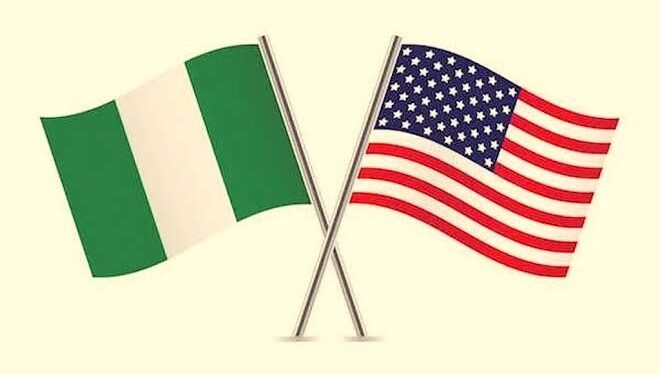Editor
The U.S. President, Donald Trump, on Thursday announced a baseline 10% tariff on all U.S. imports.
The sweeping move could redefine global commerce, Nigeria’s inclusive.
This calls for the need for Nigeria to revise its tariff regimes or negotiate new trade terms, anchored on serious commitment and political will to diversifying its economy, according to news gathered From The Street,(FTS).
Under the new policy, which Trump regards as a new era of fair trade, exports from Nigeria to the US will attract a 14% tariff compared to the 27% that the US government claims it receives from Nigeria.
The announcement tagged “Liberation Day,” marks a shift from decades of free-trade history that characterised the global economy since World War II.
The development comes as Nigeria is currently looking to diversify her economy, export inclusively beyond crude oil.
This has been on the policy agenda of successive governments, but lacking political will for implementation.
This means Nigeria needs to revise its tariff regimes or negotiate new trade terms, otherwise, its economy could lose access to the world’s largest consumer market.
Besides, Trump’s new reciprocal tariff policy could mean Nigeria may even face higher barriers to entry.
Nigeria’s trade with the United States totaled N31.1 trillion between 2015 and 2024 (10 years), according to data from the Nigerian Bureau of Statistics (NBS). Total imports within this period were N16.4 trillion or 8.7% of Nigeria’s global exports.
According to the data, Nigeria currently imposes a 27% tariff on U.S. goods. Under the new policy, the U.S. will apply a 14% reciprocal tariff on Nigerian exports, marking a significant change in the trade dynamics between both nations.
This is because the directive included sharper, country-tailored reciprocal tariffs aimed at imposing higher duties on American goods.
ALSO READ:Safe-Haven Gold Hits Record Peak On Trump’s Sweeping Tariffs
According to Trump, the development is akin to a new era of “fair trade,” promising to “supercharge America’s industrial base” and force open foreign markets long accused of shutting out U.S. goods.
“This is one of the most important days in American history,” Trump said. “We will supercharge our domestic industrial base, we will pry open foreign markets and break down foreign trade barriers.”
The Trump administration’s reciprocal tariff policy is also set to impact several African nations, with countries like Ghana, Ethiopia, and Mauritius featured on the latest White House list of tariff adjustments.
Aside from Nigeria, the new tariffs, which take immediate effect, apply to more than 50 countries.
They include major trade partners like China, the European Union, India, and Japan, as well as developing economies in Asia, Africa, and Latin America.
Trump’s new trade doctrine is a concept his administration calls “reciprocal tariffs.”
Under this framework, the U.S. imposes duties on imports equivalent to half the tariff rates those countries apply to American exports.
A chart displayed during the “Make America Wealthy Again” event listed countries deemed to be the worst offenders.
These include Vietnam, Cambodia, and Bangladesh, all of which levy tariffs above 70% on U.S. goods. Under the new plan, U.S. import tariffs on their goods will now range between 37% and 49%
Mauritius is one of the major African economies affected, with the U.S. citing an 80% tariff burden on its exports. A 40% reciprocal tariff has now been proposed—one of the steepest in the African bloc.
Ghana and Ethiopia, by contrast, impose relatively low tariffs on U.S. goods (17% and 10% respectively) and will see the U.S. apply matching or near-matching tariffs in return (10% each).
Other African countries listed include:
Algeria: 59% tariff on U.S. goods; 30% reciprocal U.S. tariff
Namibia: 42% vs 21%
Lesotho: 99% vs 50%
Kenya: 10% vs 10%
READ ALSO:
Other Key Country Tariffs On US Goods:
Vietnam 90% vs US 46%
Cambodia 97% vs US 49%
Bangladesh 74% vs US 37%
China 67% vs US 34%
Thailand 72% vs US 36%
Indonesia 64% vs US 32%
India 52% vs US 26%
Taiwan 64% vs US 32%
South Korea 50% vs US 25%
Japan 46% vs US 24%
Malaysia 47% vs US 24%
South Africa 60% vs US 30%
Sri Lanka 88% vs US 44%
Israel 33% vs US 17%
Philippines 34% vs US 17%
EU 39% vs US 20%
UK 10% vs US 10%
Brazil 10% vs US 10%
Singapore 10% vs US 10%
Chile 10% vs US 10%
Australia 10% vs US 10%
Turkey 10% vs US 10%
Pakistan 58% vs US 29%
Colombia 10% vs US 10%








